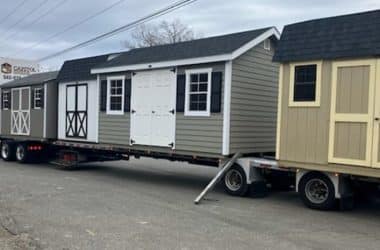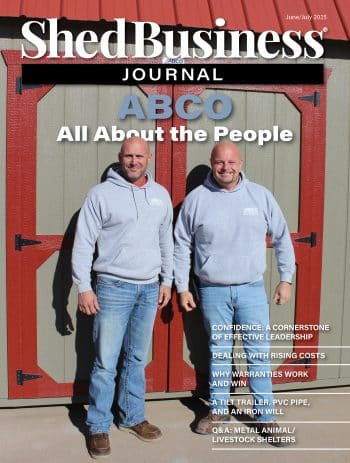
Quality.
Merriam-Webster defines the word as a “degree of excellence” or “superiority in kind.”
Quality is a word used often in the shed industry, but what does it really mean in terms of materials, structures, sales, delivery, and customer service?
How do people and companies help ensure each structure and customer contact is excellent and superior?
Shed Business Journal communicated with three shed builders to find out how they view
quality in the industry.
In your mind, what does quality mean/look like in the shed-building industry?
Rick Himsl, Himsl Building Storage Sheds, Gravette, Arkansas: Have the customer in mind.
A shed should be built and set up to last and look good for a long time. Use enough framing lumber. For instance, pre-built sheds I have seen have studs 2 feet on center. Not enough studs.
Wayne Troyer, Gold Star Buildings, Hadley, Pennsylvania: In my mind, a quality shed is a building that looks appealing and is built with quality materials that will last for many years.
Quality workmanship includes paying attention to detail. When I inspect a building, I look for straight lines, tight joints, doors lining up properly, latches and hardware working smoothly, and a consistent paint job (no light spots or runs).
Lastly, I think it’s important that the inside looks nice as well. Even when buying premium materials, you will occasionally get studs and other lumber with wane or other imperfections. With minimal effort, and by paying attention, one can strategically use those pieces and position them where the imperfections will be hidden.
One of the last things we do before pulling out a building is clipping nails that missed the studs, and sweeping it out, even using an air hose to blow out the corners and wall plates.
Giving your customers a quality experience includes everything from the sales process to the delivery of the shed. That includes hiring friendly, knowledgeable staff.
Matt Housworth, Southeastern Buildings, Eatonton, Georgia: A building that has a sturdy floor system that can be moved many times over, withstanding decades against the
elements, not leaking or structurally failing, continuing to satisfy retail customers’ needs and expectations.
Where does the industry excel when it comes to quality? Why?
HIMSL: The materials used.
Suppliers have progressed in making available materials that are focused on shed production. Now, there is less of having to make something fit in an application not intended.
TROYER: While some people may have different standards when it comes to quality, I believe a large percentage of shed builders do produce good quality sheds, or at least
acceptable by industry standards.
I also feel like there are a lot of good shed haulers out there who take pride in a job well done, and I want to give a shout-out to them—we need you guys!
A lot of the sheds I see have a nice appearance and under average circumstances will likely last for a long time.
HOUSWORTH: I believe the industry is excelling in quality in the areas of financing when it comes to ease of processing contracts and getting quick approvals.
Also, the quality of delivery and manufacturing equipment has improved over the years. Therefore, that translates directly on average to better and more consistent quality of buildings produced and a better delivery experience for the customer.
Where can the industry do a better job? Why and how?
HIMSL: Function, fit, and finish.
Roof Overhang: Most pre-built sheds I have seen don’t have a roof overhang on the front and back. It is just accepted. For function and aesthetics, there should be a roof overhang.
Nailing: More care could be taken with nailing siding and trim to make sure nails are set in accordance with siding manufacturer specifications. Others (too deep) should be caulked to be invisible when painted. This also adds longevity to the siding and trim.
Windows: Better windows are available. Primary residential-type windows perform better and don’t cost that much more. Also, framing sometimes is not added for windows; they are simply screwed to the siding and are prone to leak. Customers notice that after a few seasons.
Roofing felt: Can’t be seen but adds protection in case of shingle loss.
TROYER: Workmanship/ appearance.
I’m a detail-oriented person, so I am often quick to see flaws or things that could have been done a little bit better. Things like loose fitting joints, a crack here or there, and materials that are less than par.
And trust me, your customers will also notice those things. A lot of customers will comment on the fine craftsmanship that they see in our buildings compared to what they see on the competition’s lot, even if our basic construction is nearly the same.
Maybe it’s just me, but I feel like those things are more likely to come from a shop where buildings are “mass-produced.”
I’m not against big shops that put out a high shed count, but the more people you have working, and the more products you move, the greater the challenge will be to control the quality.
Properly training employees and ingraining in them a high standard of quality is usually easier said than done. However, if a business is going to consistently produce a high-quality product or service, clearly communicating what quality looks like and then holding employees accountable is essential.
HOUSWORTH: I’m not really sure where the industry can do a better job as a whole, but what I can say is that probably the most common problem I see or hear of is lack of transparency or lack of information at the point of sale when it comes to scheduling delivery and set up, the lead times on production, and what a customer should expect/prepare for to receive their new shed.
As an industry, we should keep in mind most customers probably have no idea what to expect when it comes to these things, and we should not assume that customers know and/or understand what our delivery and setups of their building entail.
How can businesses ensure they receive quality materials?
HIMSL: I don’t have a problem with this, since I pick my materials personally.
For those who mass-produce, feedback from the workers in the field would help to select suppliers that only send quality materials to the site in the case of site builders.
Let your suppliers know what you will not accept.
TROYER: Don’t be stingy. Don’t expect to get quality materials at rock-bottom prices.
These days, it’s not hard to find a vendor that can consistently deliver premium materials. Find a brand or two that you like and stick with those as much as possible.
When I purchase dimensional lumber, I always ask for lumber from a certain mill. If that isn’t available, I know from past experience which other mills are usually okay.
The same goes for purchasing hardware, etc. If you keep having a problem with a certain component, maybe try a different brand.
Also, don’t be afraid to tell your vendors if you’re having problems with a certain product. They should be willing to try to find a solution for you, and, if not, there’s probably another vendor that would be happy to solve your problem.
I think the Shed Builder Expo is a great place to find what is available and to learn about the new and improved products that are constantly coming to the market.
HOUSWORTH: A dedicated purchasing position in your company that not only shops pricing but also researches the quality of the supplies and tests samples of supplies
before introducing them into the manufacturing process.
Also, building healthy relationships with your vendors will help you achieve better receiving forecasts and help your vendors understand the quality of the products that you require.
How can builders ensure their employees build quality structures?
HIMSL: Assign someone with people skills to contact customers and find out by asking specific questions about what they think of the work they have received. Ask for their impressions on how the work was done.
Don’t be afraid to listen to their frank comments and thank them for their honest input. Many customers don’t have a lot of experience with construction, so the person calling
should be ready to explain why things were done as they were.
TROYER: Kind of what I answered to the previous question.
Properly training employees and ingraining in them a high standard of quality is usually easier said than done. However, if a business is going to consistently produce a high-quality product or service, clearly communicating what quality looks like, and then holding employees accountable is essential.
In addition to that, be consistent with checking their work. It’s easy to get busy and not take time to thoroughly check out each building that comes out of the shop.
Create a system that includes quality control, and then work your system.
HOUSWORTH: Providing quality, well-maintained tools, good-quality materials, and a clean, well-organized workspace.
Then, it’s training to teach employees what you expect regarding safety, workmanship, and
how to achieve these goals.
How can an operation ensure its sales and office team provide customers with quality experiences?
HIMSL: Invest some time and money in training. You might need to bring someone in who has these training and motivational skills.
I worked for a construction company 45 years ago whose salesmen were making promises that we site workers were unaware of. We had to deal with customers who were hurt and disappointed that we were not providing what was promised.
However, our instructions did not match up with the customers’ expectations. Bad for us.
TROYER: Provide your salespeople with the information they need.
A customer will have a much better experience when working with someone who is well-informed about their product and can answer their questions on the spot.
Not only should a salesperson know their product, but they should know how to relate to people. Be friendly and show interest in the other person and their needs.
Act as if you’re glad to see them. If you’re having a bad day, don’t let the customer even suspect it.
HOUSWORTH: It is the same as in for your employees that build for you.
Clean, well-organized environment, good tools and technology, and discussions on what you expect in the service that they provide.
Stress efficiency. Your customers’ time is very important to them, not just the customers you may be attending to at that moment, but the next customers that are waiting for you to
finish up so that you can help them.
Keep in mind that the salesperson is your frontline employee. They are not just selling the product, but they are selling themselves and your company.
They must earn that customer’s business with clear knowledge of the product, delivery process, lead times on production/delivery, and follow through with that customer.
They must also provide realistic information to the customer. Overpromising and under-delivering will leave the customers with a poor experience they will not forget. That is not fair to the customers’ time and financial resources.
How can builders/dealers ensure haulers (whether on-staff or hired haulers) provide quality deliveries?
HIMSL: I only build on-site, but I would say that feedback from the customer would be the best indicator of whom to select as the best provider.
TROYER: Hire someone of integrity and who has good core values. Again, clearly communicate the results you want and hold them accountable.
Also, be willing to pay them enough to do their job right. If you’re trying to get by paying as
little as you can, your hauler may feel like he doesn’t have time to make sure everything is done right.
HOUSWORTH: Again, good equipment is a big step toward an on-time, quality delivery experience for the customer.
We own our trucks, and our delivery techs only work for us. Therefore, we have more control over scheduling deliveries and set-ups.
That also allows us control regarding the types of delivery equipment used and the training of our employees.
Regardless of whether your haulers are on staff or hired haulers, you should do follow-up calls at random to your customers to thank them for the business and ask them how the delivery and set-up experience was for them. Same goes for your wholesale accounts.
Many times, we only address poor feedback with set-ups and/or deliveries, but positive experiences are just as important.
Your haulers need to hear the positive feedback. It helps them build and improve on what’s working well for them.
This feedback will allow you and your haulers/set-up crews to have the information needed to improve service and/or affirm you are doing well.
It can also help build positive working relationships between you and your haulers.
Please share anything else you consider important about quality in the shed-building industry.
HIMSL: Love people, especially customers who have put their trust in you as a shed company. 1 Corinthians 13:4-5: “Love … does not look for its own interests.”
TROYER: No matter which aspect of the business you are in, whether you’re a salesperson, a builder, a shed hauler, or whatever your position, I believe character plays a large part in giving your customers a quality product and a quality experience.
Someone who has good core values and puts others first will have a head start in the game of quality.




